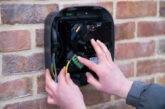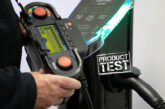
Karl Weller of Heath Electrical takes a step up the EV installation ladder as he reviews the NICEIC online EV training course.
Q. Why were you interested in taking part in the NICEIC EV online training course?
We’re very aware of the rise in demand for professionals with EV charge installation expertise, so its a specialism that we’re keen to add to the business. As an individual, I also have a passion for cars and the way that technology in this industry is evolving, therefore taking part in any kind of training that can help improve my knowledge base in this area is something I’ve been keen to do for a while.
Q. How did you find the process of accessing the training?
It was really easy to get everything set up and ready, and was just a case of making sure that I was online and in the session a few minutes before it all started. Because the course was held remotely, it meant that I could take part from the comfort of my own work station at the office.
Q. Had you undertaken an online training course before and how did you find the experience?
I’ve taken part in a few training sessions before, but all have previously been in-person. Clearly the opportunities for face-to-face training are going to be limited for the foreseeable future, so it was great to get a taste for this alternative type of learning. I was pleasantly surprised at how easy it all was to follow and clearly there are some massive benefits in terms of convenience etc. for this type of training.
Q. How was the course information presented to you? Did you find it interesting?
The material was delivered in a way, and at a speed, that made it very easy to keep up with everything. One initial concern about moving away from in-person training was that I thought the course may end up being ‘death by PowerPoint’, but that wasn’t the case at all. Our tutor spoke clearly and concisely, was open to questions and feedback and made sure that every point was supported by diagrams and slides. Interestingly, there’s probably less disruption with this type of training as you don’t have individuals losing concentration or chatting, which can sometimes be the case with class-based learning.
Q. How long did the course last? Give us a few examples of some subjects that were covered.
The course was a (working) day in length and covered all the things that a potential new entrant to this market would need to know. This included items like legislation and the requirements of BS 7671 with regards to the changes to the section on electric vehicle charging, government incentives and connection to domestic and commercial installations.
Q. What happened at the end of the course? Did you get a certificate or proof of attendance?
Once the course material had been presented to us, we were then asked to complete an online test/exam, which referenced the content we’d learned throughout the day. Once completed, we received a certificate to confirm that we’d attended and passed the exam.
Q. Would you recommend the course to fellow electricians?
Absolutely. Clearly there some potential downsides with online training, especially as you’re in the lap of the gods at times in terms of internet connections and speeds. That said, this was a really convenient and professional way to learn, so I’d recommend that all electricians look into this course (and others) if they’re looking to get into the world of EV installs.
In response to high demand and customer feedback, NICEIC is now offering weekend dates for the Virtual Classroom – Electric Vehicle Charging training course, providing even more flexibility.
Get more details and find out how to book yourself on a course by clicking here









